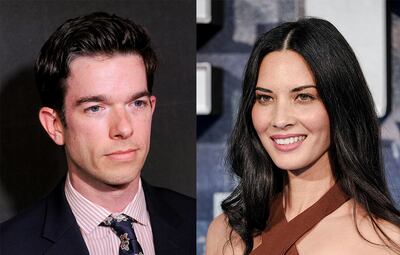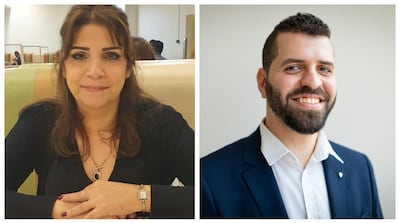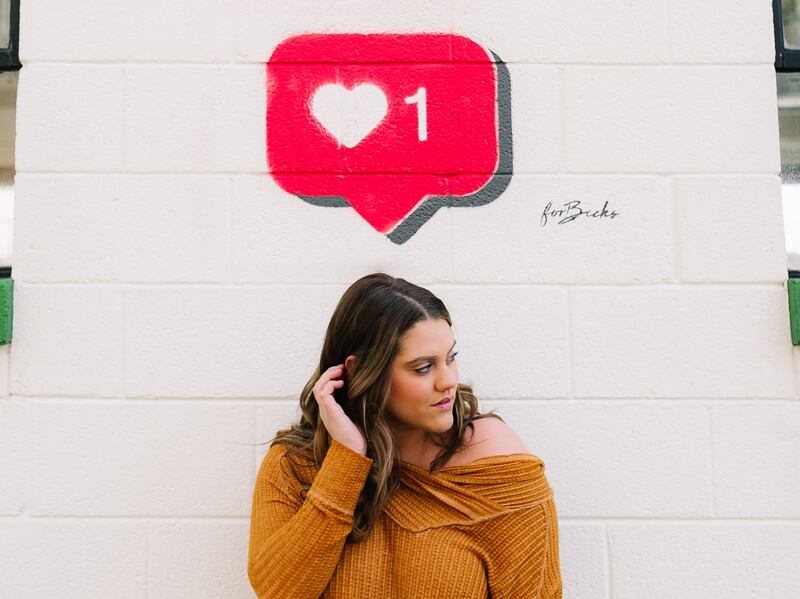Until recently, you might have gone your whole life without hearing the term “parasocial relationship”, let alone started asking yourself if perhaps you were maybe in one … or two, or three of them yourself.
The term was recently brought out of psychologists’ therapy rooms and into the mainstream during the internet furore that blew up around Saturday Night Live alumnus and comedian John Mulaney, 39, and The Newsroom actress Olivia Munn, 41.
The pair’s new relationship sent the rabid fan bases of both Mulaney and his estranged wife, artist Anna Marie Tendler, into a tailspin on social media and in online forums, as Tendler's supporters rushed to condemn Mulaney fans’ defence of their hero as evidence they were indulging in a parasocial relationship with the comic.
After all, they don't know him, so why were they acting like they did?

Parasocial relationships are one-sided bonds people develop with public and media figures such as actors, musicians, influencers or politicians, although the term can also be applied to peers. Unlike developing a crush, those indulging in parasocial relationships feel they are friends with the person – that they know them, and know what they’re thinking and feeling.
For Mulaney, whose white, middle-class, male-skewing supporters see him as a comedy visionary and relatable everyman, the very fact their hero was being criticised for the speed of his new romance was tantamount to blasphemy.
“People usually get into a parasocial relationship by falling in love with celebrities, famous people, influencers or even fictional characters,” says Helen Najar, hypnotherapist and well-being counsellor at Miracles wellness centre in Dubai. “They create unrealistic ideas about a person and feel as if they are part of their life. They can also be physically attracted to them and feel emotionally attached, and so begin to give much interest, time and emotional energy to the other party.
“This is commonly seen with fans of celebrities, as they truly believe they know the person rather than understanding that they only know the character being presented by the person.”
What is a parasocial relationship?
Parasocial relationships have been around for as long as humans, but under different names and guises. Behaviours that previous generations would have termed as ardent admiration for someone, or even a long-distance crush, would almost certainly these days be deemed parasocial.
The term was first coined by sociologists Donald Horton and R Richard Wohl in their 1956 paper Mass Communication and Para-Social Interaction, in which they said: “The crucial difference in experience obviously lies in the effective lack of reciprocity … The interaction, characteristically, is one-sided, non-dialectical and controlled by the performer.”
In short: you can like a certain celebrity all you want, but they’re not going to like you back.
Najar says: “This form of ‘relationship’ can give the individual a sense of belonging and that they are part of a group who shares their emotional connection of love and admiration with the said celebrity [character], which in a way normalises the relationship.”
How are modern parasocial relationships formed?

While parasocial relationships are not new, the levels at which they are indulged in these days is. The internet, more specifically social media, has opened parasocial relationships up to unprecedented and infinite possibilities.
“If you think about it, before social media, the only time we got to see celebrities was on the screen playing a role or idolised in posters on our bedroom wall,” says Hayley Hilton, social media strategist and host of the Social in 5 podcast. “Now with social media – and I’m thinking of Instagram and TikTok especially – we have access to their real lives. A glimpse into their world.
“There are two forces that draw us into that world,” she explains. “On the one hand it’s the opportunity to escape into a glamorous lifestyle since celebrities can now take us behind the curtain of exclusive experiences that were previously reserved for only the rich and famous. And on the other hand, we get to see them chilling on the couch, cooking in the kitchen or awkwardly learning TikTok dances with their kids, which makes them feel more human. More like they’re ‘just like us’, creating a perceived sense of closeness."
It is this need for connection and belonging in what many view as our increasingly fractured and remote societies and communities, which fuels modern parasocial relationships.
“Humans are social beings in nature,” says Mina Shafik, psychologist at Thrive Wellbeing Centre in Dubai by Dr Sarah Rasmi. “We tend to seek connections with others constantly. When you see someone has similarities with you, hobbies, activities, life experiences, emotions, you tend to form a connection with that person. Moreover, we tend to connect with people who share personal information with us, whether it is sharing their emotions, dearest memories or even the interior of their bedrooms.”
The tipping point into obsession
“It’s important to remember that on social media we’re getting a slice of someone’s life – a highlights reel,” says Hilton. “How much of that is a social media personality? Acting? A heightened version of themselves? We should see parasocial relationships as complementary, but not replacements for real human connection.”
Despite living in times of peak oversharing online, most people understand the parameters of their parasocial relationships. They know that Justin Bieber isn’t going to leave Hailey for them because they slid into his DMs, nor will Sonam Kapoor Ahuja invite them round for coffee because they admired her living room decor on Instagram.
“As with all things, good and bad co-exist and this can be seen when parasocial relationships tip into obsession, and this obsession or idealisation of a character can affect both adults and children,” says Najar. “In children, this can become dangerous if the child idolises a character and aspires to be like them, for example a certain character or celebrity’s body type.
“In adults, these obsessive behaviours can be seriously detrimental when an individual becomes obsessed with the character or celebrity to the extent they want to ‘be near them’ or be a ‘part of their life’,” she says. “They may even go to extreme measures to impress them, believing this will make a difference to their perceived relationship.”
There are many incidents throughout history that likely started out as parasocial before darkening into obsession. In 1981, for example, John Hinckley Jr famously shot then-US president Ronald Reagan in order to get actress Jodie Foster’s attention, to whom he had sent numerous love letters and poems.
“Parasocial relationships can be harmful when the person becomes obsessed with the celebrity’s life,” says Shafik. “It also becomes problematic when the person feels entitled to know and meet this celebrity. It is important to respect boundaries. Just because they share some personal information, that doesn’t mean that they should share everything with us.”
Hilton says: “I think where it starts to go overboard is when fans feel a sense of entitlement to the celebrity and expects the celebrity to behave in a certain way, which is what we saw happen with John Mulaney and Olivia Munn.”
Enjoying a healthy parasocial relationship: ‘They help people feel more connected’

This is not to say that every parasocial relationship is unhealthy, says Shafik, "because it shows the individual that celebrities can experience similar life experiences. It makes the person feel that they are not alone, and there are other people out there who do and feel the same things they are experiencing.
“When psychologists conduct group therapy, one of the main purposes of being in a group is to let the participants know that they are not alone in their struggles,” he says. “That fact by itself can be healing. So, you can imagine how relieving it can be when one sees a celebrity, a person who is deemed a role model for many, share the same hobbies, activities, struggles and life experiences.”
The spotlight being shone on parasocial relationships also coincides with the pandemic, which caused people to be confined to their homes, and media and content consumption go through the roof. Similarly stuck in their mansions, celebrities started offering even more insights into their lives, including their homes, pets, meals and daily schedules. All of which made a desire on the part of the fan to “know more” seem less intrusive.
“The expansion of social media means people have unlimited access to a variety of platforms, entertainment sites and celebrities,” says Najar, “making the ability to feel connected to these celebrities otherwise private lives more attainable and socially acceptable.”
“If people have a role model or someone they genuinely like" says Hilton, "they keep up with that person’s life and it brings them value – they learn, feel inspired or simply entertained – it’s a good thing.
“By sharing stories and experiences it can help others to feel less alone. Especially after a pandemic year, where a lot of people have been feeling isolated, these parasocial relationships can help people feel more connected.”






